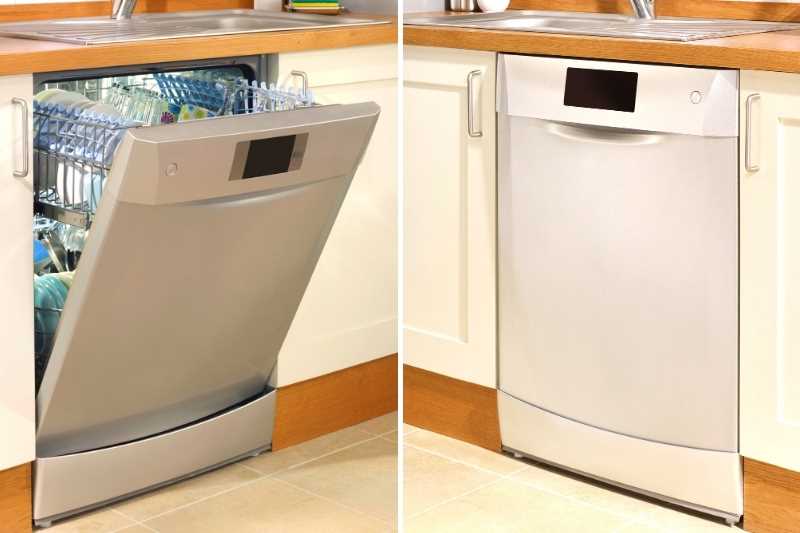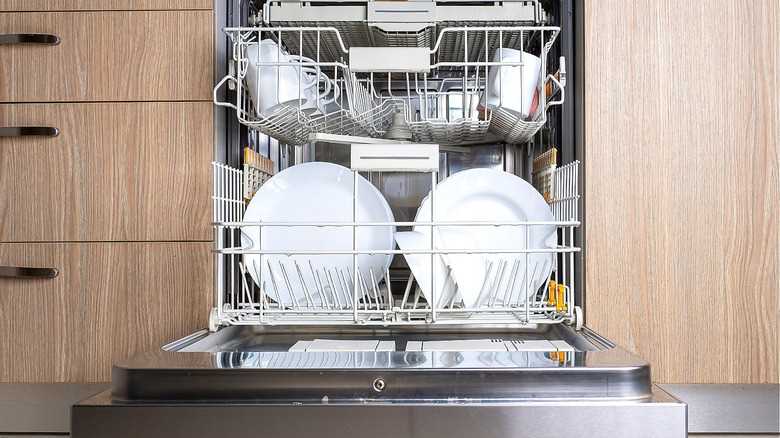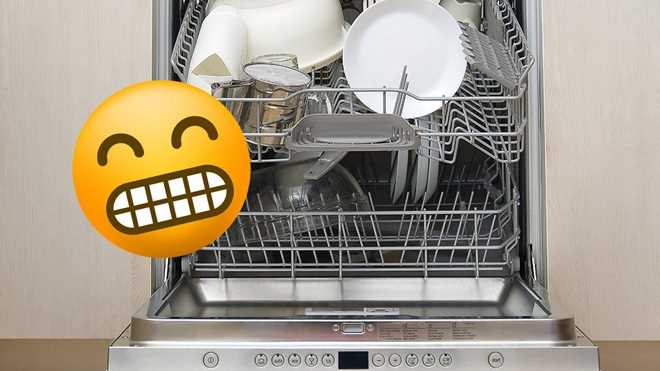
When it comes to leaving your dishwasher open or closed when you’re not using it, there’s a lot of debate within the home appliance community. Some experts argue that leaving it open is beneficial because it allows the moisture inside the dishwasher to evaporate, preventing the growth of bacteria and mold. On the other hand, some experts believe that leaving it closed is the best option because it keeps the dishwasher clean and prevents any external factors from getting inside.
One thing is clear though, leaving your dishwasher unattended for long periods of time can lead to some risks. If the dishwasher is not properly cleaned or the water used to wash the dishes is not hot enough, it can lead to the development of bacteria or mold. These developments can not only affect the cleanliness of your dishes, but they can also cause damage to the dishwasher’s internal parts. In some cases, there is even a risk of an emergency situation occurring, such as a hose breaking or a mid-cycle shutdown. Therefore, it’s important to know the best practices for keeping your dishwasher in good shape when you’re not using it.
First and foremost, it is recommended to wipe down the inside of the dishwasher after every use. This helps to remove any remaining food particles or moisture that may be present after a cycle. It is also important to clear any clogs or blockages in the drainage hose. If there is any leftover food particles or debris in the hose, it can cause the dishwasher to back up or not work properly.
Another important step is to keep the dishwasher door closed when it’s not in use. This prevents any dust or dirt from getting inside the dishwasher and keeps it clear of any potential bacteria or mold growth. However, if you frequently use your dishwasher and don’t give it enough time to dry out, leaving it open can be a good option. This allows the moisture to evaporate and prevents any musty or unpleasant odors from developing.
Finally, it’s important to follow the manufacturer’s instructions when it comes to using your dishwasher. They will provide you with the best guidance on how to properly clean and maintain your dishwasher to prevent any potential issues. If you have any specific concerns or questions, it’s always a good idea to reach out to the manufacturer or a professional for expert advice.
In conclusion, whether you leave your dishwasher open or closed when you’re not using it depends on a variety of factors. The key is to keep your dishwasher clean and in good shape to prevent any potential bacterial or mold growth. Whether you choose to leave it open or closed, following the proper maintenance and cleaning procedures will ensure that your dishwasher works efficiently and keeps your dishes sparkling clean.
Benefits of Leaving a Dishwasher Open When Not in Use

- Prevents the growth of mold and mildew: Leaving the dishwasher open after use allows the interior to air out, preventing the buildup of moisture that can lead to mold and mildew growth. Mold and mildew can be harmful to your health and can also cause unpleasant odors.
- Promotes efficient drying: By leaving the dishwasher open, the moisture trapped inside the machine can evaporate more quickly, resulting in drier dishes. This can save you time and energy by reducing the need for hand drying or running another drying cycle.
- Reduces the risk of blockages: When the dishwasher is left closed, any leftover food particles or debris may not fully dry, causing them to stick to the interior surfaces and potentially leading to blockages in the drain or spray arms. Keeping the dishwasher open allows for better airflow and helps to prevent these blockages from occurring.
- Ensures safety: Leaving the dishwasher open when not in use is a safety precaution, especially if you have small children or pets in the house. It prevents them from accidentally closing the door and potentially trapping themselves inside the appliance.
- Keeps the interior clear: Leaving the dishwasher open allows you to visually inspect the interior and make sure there are no leftover items or utensils that need to be removed. This helps to ensure that your dishwasher remains in good working condition and prevents any potential damage to the dishwasher or your dishes during the next cycle.
- Prevents odors: The air circulation that occurs when the dishwasher is left open helps to prevent unpleasant odors from developing. Without proper airflow, any residual food particles or water droplets can become stagnant, leading to a foul smell.
In conclusion, leaving your dishwasher open when not in use has several benefits. It prevents mold and mildew growth, promotes efficient drying, reduces the risk of blockages, ensures safety, keeps the interior clear, and prevents odors. By implementing this simple habit, you can maintain the optimal performance of your dishwasher and enjoy clean, fresh-smelling dishes every time.
Drawbacks of Leaving a Dishwasher Open When Not in Use
Leaving a dishwasher open when it’s not in use may seem like a convenient way to let it air out and dry, but there are some drawbacks to consider.
1. Moisture and Mildew
When you leave your dishwasher open, moisture from the dishes and the residual water in the machine can escape into the surrounding area. This can create a damp environment that is ideal for mildew and mold to grow.
Additionally, leaving the dishwasher open may cause moisture to accumulate on nearby surfaces like countertops and cabinets, leading to potential damage over time.
2. Risk of Injury and Accidents
An open dishwasher poses a risk of injury, especially if you have children or pets in the house. They may accidentally run into the open dishwasher door, causing harm to themselves or damaging the appliance.
Leaving the dishwasher open also increases the chances of tripping over the door or accidentally spilling the contents of the dishwasher if someone bumps into it. This can create a hazardous situation in your kitchen.
3. Unpleasant Odors
When the dishwasher is left open, any odors from the dirty dishes and food particles inside can spread throughout your kitchen. This can result in an unpleasant smell that lingers in the air.
Furthermore, leaving the dishwasher open allows the odor to permeate your kitchen fixtures and clothes, requiring more effort to get rid of the smell.
4. Potential Damage to Dishwasher
Leaving the dishwasher open exposes it to more dust, debris, and potential damage from accidental spills or objects falling into it. These elements can interfere with the proper functioning of the dishwasher and may require repairs or maintenance in the long run.
5. Energy Efficiency
Leaving the dishwasher open allows the warm air inside to escape, causing the dishwasher to lose heat. When you start the dishwasher for the next cycle, it will need to use more energy to heat up the water, decreasing its overall energy efficiency.
Final Thoughts
While leaving a dishwasher open may seem like a convenient option, it’s important to consider the potential drawbacks. If you want to avoid mildew, unpleasant odors, potential accidents, and maintain your dishwasher’s energy efficiency, it’s generally best to keep the dishwasher closed when it’s not in use.
For further information and expert tips, you can consult appliance manuals and references. Additionally, if you have any concerns or questions about your specific dishwasher model, it’s recommended to contact the manufacturer or an appliance professional for further guidance.
Benefits of Keeping a Dishwasher Closed When Not in Use
When it comes to using a dishwasher, there are some decisions you have to make even when you’re not actively running a cycle. One such decision is whether to keep the dishwasher door open or closed when it’s not in use. While leaving the dishwasher door open may seem like a logical choice to air out any moisture or odors, there are actually several benefits to keeping it closed:
- Preventing dust and debris: Keeping the dishwasher closed when not in use stops dust and debris from settling on your dishes, preventing them from getting dirty even before the next wash cycle.
- Avoiding bacterial growth: Leaving the dishwasher door open allows for bacterial growth since the moist environment inside the dishwasher is perfect for their development. Keeping it closed prevents bacterial growth and helps maintain a hygienic environment.
- Protecting delicate items: If you store delicate items in your dishwasher, keeping the door closed helps shield them from accidental bumps or falls that could occur if the door is open.
- Preventing mold and mildew: When the dishwasher door is left open, the moisture inside can create a breeding ground for mold and mildew. Keeping the door closed helps prevent the growth of these unsightly and potentially harmful substances.
- Preserving energy: By keeping the dishwasher closed, the heat generated during a previous cycle is retained, allowing the dishwasher to stay warm and dry for a longer period. This reduces the need for the dishwasher to run longer or for heated drying cycles.
- Maintaining aesthetic appeal: Keeping the dishwasher closed when not in use helps maintain a tidy and organized kitchen appearance by hiding the clutter of dishes inside.
It’s important to note that these benefits may vary depending on the specific dishwasher model you’re using, so be sure to consult the manufacturer’s instructions for the best practices for your particular dishwasher.
Drawbacks of Keeping a Dishwasher Closed When Not in Use
While it may seem convenient to simply close the dishwasher door when you’re not using it, there are some drawbacks to this approach that you should be aware of.
Potential for Safety Hazards
One of the main drawbacks of keeping a dishwasher closed when not in use is the potential for safety hazards. Dishwashers can sometimes malfunction and cause fires. If you leave the dishwasher door closed and a fire were to start, it could go unnoticed for a longer period of time, increasing the risk of damage to your home and endangering your safety.
Potential for Mold and Bacteria Growth
Another drawback of keeping a dishwasher closed when not in use is that it can create a moist environment inside, which is an ideal breeding ground for mold and bacteria. If any food particles or residue are left behind in the machine, they can quickly start to develop mold and bacteria. This can lead to unpleasant odors, health risks, and even damage to the dishwasher itself.
Potential for Blockages

Leaving the dishwasher closed when not in use may also increase the likelihood of blockages in the dishwasher’s drainage system. If food particles or other debris are left in the dishwasher and it remains closed, these particles can accumulate and create blockages over time. This can result in the dishwasher not draining properly or even breaking down altogether.
Lack of Thorough Cleaning
When you leave the dishwasher closed, it prevents proper ventilation and air circulation inside the machine. This can inhibit the drying process and make it more difficult for the dishwasher to clean the dishes thoroughly. It’s important to allow the dishwasher to air out between cycles to ensure optimal cleaning results.
Potential for Solvent Build-up
Leaving the dishwasher closed for extended periods of time without running cycles can also result in build-up of dishwasher detergents or other dishwasher cleaning agents. When these solvents sit stagnant in the dishwasher, they can become concentrated and cause damage to the dishwasher’s components or affect the taste of your dishes.
Conclusion

While it may be tempting to keep your dishwasher closed when not in use for the sake of neatness or storage, it’s important to consider the potential drawbacks. By leaving the dishwasher door open, you can prevent safety hazards, reduce the risk of mold and bacteria growth, avoid blockages and ensure a thorough cleaning. Ultimately, it’s best to follow the manufacturer’s instructions and guidelines for your specific dishwasher model.
How Can You Clean A Dishwasher That Has Not Been Used For A Long Time
If you have a dishwasher that has not been used for a long time, it is important to clean it properly before using it again. Even though it has not been in use, the inside of the dishwasher can still accumulate enough dirt and bacteria, causing unpleasant odors and potentially affecting the performance of the machine. In this article, we will discuss how to clean a dishwasher that has been unused for a long time.
1. Clear the References before Cleaning
Before you start cleaning, make sure to clear the dishwasher of any dishes or items that may have been left behind. Check the filter and remove any food particles or debris that may have accumulated.
2. Run a Cleaning Cycle

To thoroughly clean a dishwasher that has not been used for a prolonged period, run a cleaning cycle. You can use dishwasher cleaners that are specifically designed to remove lime, scale, and other build-ups. Follow the instructions on the cleaner packaging for the best results. During the cleaning cycle, the dishwasher will run hot water and dispense the cleaner throughout the machine, removing any dirt and bacteria.
3. Pay Attention to Mold and Mildew

If you notice any mold or mildew inside the dishwasher, it is important to address it before using the machine. Mold and mildew can cause unpleasant odors and can be harmful to your health. Use a mixture of water and vinegar, or a mild bleach solution, to clean the affected areas. Be sure to wear gloves and ventilate the room properly when working with bleach.
4. Clean the Exterior

Don’t forget to clean the exterior of the dishwasher as well. Wipe down the control panel, door, and handle with a damp cloth and mild detergent. This will help remove any dirt or grime that may have accumulated.
5. Regular Maintenance
To prevent a buildup of dirt and bacteria in the future, it is important to regularly maintain your dishwasher. This includes clearing the filter after each use, wiping down the inside of the door and sides, and running a cleaning cycle with dishwasher cleaner every few weeks.
In conclusion, cleaning a dishwasher that has not been used for a long time is essential to maintain its performance and prevent any potential health hazards. By following the steps mentioned above, you can ensure that your dishwasher is clean and ready to use.
FAQ
What is the best way to leave a dishwasher when not in use?
The best way to leave a dishwasher when not in use is to keep the door closed. This helps to prevent any dust or debris from settling inside and also keeps children or pets from accidentally getting inside.
Is it true that leaving the dishwasher open can cause odours?
Yes, leaving the dishwasher open when not in use can lead to odours. When the dishwasher is closed, any remaining moisture evaporates, but when it’s left open, the moisture can linger and cause unpleasant smells.
Should I leave the dishwasher door open to let it dry naturally?
No, leaving the dishwasher door open to let it dry naturally is not necessary. Most dishwashers are designed to allow for proper drying even with the door closed. Keeping the door closed also helps to prevent any accidental spills or falls.
Can leaving the dishwasher open save energy?
Leaving the dishwasher open when not in use does not save energy. In fact, keeping the door closed ensures that the dishwasher maintains its energy efficiency. When the door is open, the heat and energy inside the dishwasher can escape, leading to longer drying times and increased energy consumption.
Is it possible for mold to grow inside a closed dishwasher?
Mold can grow inside a closed dishwasher if there is excess moisture and food residue left behind. It is important to regularly clean and maintain the dishwasher to prevent mold growth. Keeping the door closed when not in use helps to reduce the moisture levels inside and minimize the risk of mold.
Can leaving the dishwasher door open attract insects?
Leaving the dishwasher door open when not in use can attract insects, especially if there are food particles or residues present. Insects are attracted to the warmth and food sources, and an open dishwasher can provide both. Keeping the door closed helps to keep insects out and maintain a clean and hygienic environment.
Should I leave the dishwasher door open overnight?
No, it is not necessary to leave the dishwasher door open overnight. Closing the dishwasher door ensures that it remains clean, dry, and ready for use when needed. Leaving the door open overnight can lead to dust and debris settling inside and can also pose a safety hazard.
















